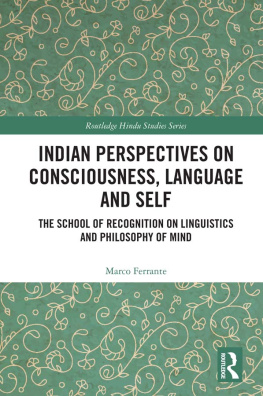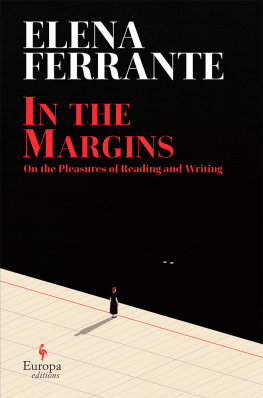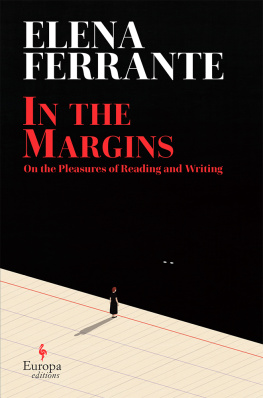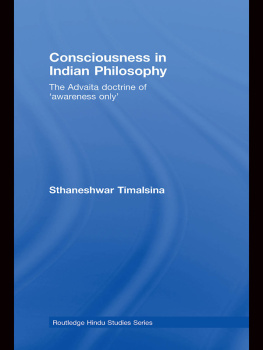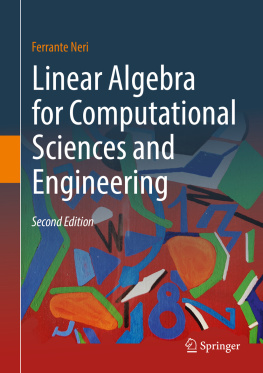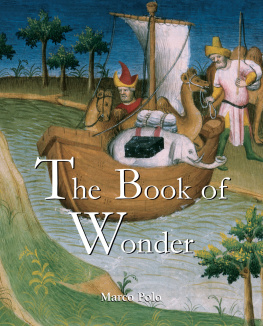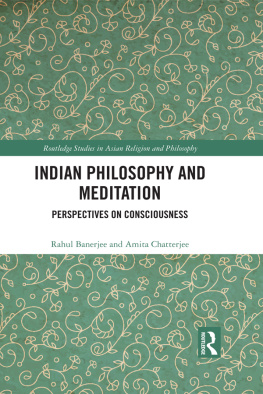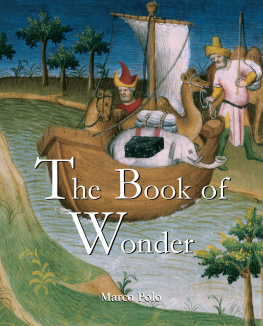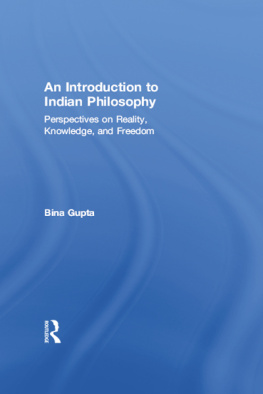Ferrante Marco - Indian Perspectives on Consciousness, Language and Self
Here you can read online Ferrante Marco - Indian Perspectives on Consciousness, Language and Self full text of the book (entire story) in english for free. Download pdf and epub, get meaning, cover and reviews about this ebook. year: 2020, publisher: Taylor & Francis Group, genre: Religion. Description of the work, (preface) as well as reviews are available. Best literature library LitArk.com created for fans of good reading and offers a wide selection of genres:
Romance novel
Science fiction
Adventure
Detective
Science
History
Home and family
Prose
Art
Politics
Computer
Non-fiction
Religion
Business
Children
Humor
Choose a favorite category and find really read worthwhile books. Enjoy immersion in the world of imagination, feel the emotions of the characters or learn something new for yourself, make an fascinating discovery.
- Book:Indian Perspectives on Consciousness, Language and Self
- Author:
- Publisher:Taylor & Francis Group
- Genre:
- Year:2020
- Rating:4 / 5
- Favourites:Add to favourites
- Your mark:
- 80
- 1
- 2
- 3
- 4
- 5
Indian Perspectives on Consciousness, Language and Self: summary, description and annotation
We offer to read an annotation, description, summary or preface (depends on what the author of the book "Indian Perspectives on Consciousness, Language and Self" wrote himself). If you haven't found the necessary information about the book — write in the comments, we will try to find it.
Indian Perspectives on Consciousness, Language and Self — read online for free the complete book (whole text) full work
Below is the text of the book, divided by pages. System saving the place of the last page read, allows you to conveniently read the book "Indian Perspectives on Consciousness, Language and Self" online for free, without having to search again every time where you left off. Put a bookmark, and you can go to the page where you finished reading at any time.
Font size:
Interval:
Bookmark:

This book examines the theory of consciousness developed by the school of Recognition, an Indian philosophical tradition that thrived around the tenth c. CE in Kashmir, and argues that consciousness has a linguistic nature. It situates the doctrines of the tradition within the broader Indian philosophical context and establishes connections with the contemporary analytic debate.
The book focuses on Utpaladeva and Abhinavagupta (tenth c. CE), two Hindu intellectuals belonging to the school of Recognition, Pratyabh in Sanskrit. It argues that these authors promoted ideas that bear a strong resemblance with contemporary higher-order theories of consciousness. In addition, the book explores the relationship between the thinkers of the school of Recognition and the thought of the grammarian and philosopher Bharthari (fifth c. CE). The book bridges a gap that still exists between scholars engaged with Western traditions and Sanskrit specialists focused on textual materials. In doing so, the author uses concepts from contemporary philosophy of mind to illustrate the Indian arguments and an interdisciplinary approach with abundant reference to the original sources.
Offering fresh information to historians of Indian thought, the book will also be of interest to academics working on Non-Western Philosophy, Comparative Philosophy, Indian Philosophy, Religion, Hinduism, Tantric Studies, and South Asian Studies.
Marco Ferrante is a specialist in Indian philosophy, with a special focus on epistemology, philosophy of mind, and philosophy of language. He was Berggruen Fellow in Comparative Philosophy at the University of Oxford, UK.
Series Editor: Gavin Flood
Oxford Centre for Hindu Studies

The Routledge Hindu Studies Series, in association with the Oxford Centre for Hindu Studies, intends the publication of constructive Hindu theological, philosophical and ethical projects aimed at bringing Hindu traditions into dialogue with contemporary trends in scholarship and contemporary society. The series invites original, high quality, research level work on religion, culture and society of Hindus living in India and abroad. Proposals for annotated translations of important primary sources and studies in the history of the Hindu religious traditions will also be considered.
Caitanya Vaiavism in Bengal
Social Impact and Historical Implications
Joseph T. OConnell, edited by Rembert Lutjeharms
Vedic Practice, Ritual Studies and Jaiminis Mmsstras
Dharma and the Enjoined Subject
Samuel G. Ngaihte
The Legacy of Vaiavism in Colonial Bengal
Edited by Ferdinando Sardella and Lucian Wong
Salvation in Indian Philosophy
Perfection and Simplicity for Vaieika
Ionut Moise
The Goddess and The Sun in Indian Myth
Power, Preservation and Mirrored Mhtmyas in the Mrkaeya Pura
Raj Balkaran
Indian Perspectives on Consciousness, Language and Self
The School of Recognition on Linguistics and Philosophy of Mind
Marco Ferrante
For more information about this series, please visit: www.routledge.com/asianstudies/series/RHSS

First published 2021
by Routledge
2 Park Square, Milton Park, Abingdon, Oxon OX14 4RN
and by Routledge
52 Vanderbilt Avenue, New York, NY 10017
Routledge is an imprint of the Taylor & Francis Group, an informa business
2021 Marco Ferrante
The right of Marco Ferrante to be identified as author of this work has been asserted by him in accordance with sections 77 and 78 of the Copyright, Designs and Patents Act 1988.
All rights reserved. No part of this book may be reprinted or reproduced or utilised in any form or by any electronic, mechanical, or other means, now known or hereafter invented, including photocopying and recording, or in any information storage or retrieval system, without permission in writing from the publishers.
Trademark notice: Product or corporate names may be trademarks or registered trademarks, and are used only for identification and explanation without intent to infringe.
British Library Cataloguing-in-Publication Data
A catalogue record for this book is available from the British Library
Library of Congress Cataloging-in-Publication Data
A catalog record for this book has been requested
ISBN: 978-0-367-51794-6 (hbk)
ISBN: 978-1-003-05853-3 (ebk)
Typeset in Times New Roman
by Apex CoVantage, LLC
This book has been researched and written at two different institutions, the Austrian Academy of Sciences in Vienna and Wolfson College, University of Oxford. I am grateful to the Forderung Wissenchafts Funds (FWF) and the Berggruen Foundation for having financially supported me throughout the time I have worked on this book and for allowing me to pursue my research interests in such inspirational environments. In Vienna, my sincere gratitude goes to the three directors of the Institute of Cultural and Intellectual History of Asia (IKGA), with whom I had the privilege to work: the greatly missed Helmut Krasser, Vincent Eltschinger, and Birgit Kellner. They have provided me with intellectual and practical support all through the almost five years I spent at the Institute, without the slightest doubt one of the most constructive and happiest periods of my life. I am particularly grateful to Vincent for allowing me to join the IKGA as a young post-doc researcher in one of his projects and to both him and Birgit for their support, guidance, and friendship that are still lively and ongoing.
My sincere gratitude goes also to Marion Rastelli and Isabelle Rati for having involved me in the FWF-funded project A aiva Interpretation of the Buddhist Theory of Exclusion. The undertaking was originally meant to investigate Pratyabhijs treatment of the Buddhist theory of apoha. Upon Isabelles appointment as professor in Paris, I was allowed to step in and to turn the project into an investigation of the relationship between Bharthari and the aiva school. The first seeds of this book were sown in the two years I spent working under Marions supervision.
In Oxford, I am obliged to the Wolfson College for providing me a wonderful working environment and in particular to Richard Sorabji for his generous, friendly support and for the fascinating discussions we had during our philosophical lunches. I am likewise filled with gratitude for Diwakar Acharya and his students at Oxfords Faculty of Oriental Studies. Re-reading with them Utpaladevas kriks during Hilary Term 2019 has given me new insights into the text and much food for thought.
Several friends and colleagues have helped me in one way or another over the course of the years. I am particularly thankful to Elisa Freschi for backing and appreciating my work since the very beginning. I am also indebted to Daniele Cuneo, Hugo David, Camillo Alessio Formigatti, Alessandro Graheli, Patrick McAllister, Nina Mirnig, Cristina Pecchia, Gianni Pellegrini, Ernst Prets, and Toshikazu Watanabe. Furthermore, I am grateful to Routledges anonymous reviewer for the helpful suggestions and constructive criticism.
Font size:
Interval:
Bookmark:
Similar books «Indian Perspectives on Consciousness, Language and Self»
Look at similar books to Indian Perspectives on Consciousness, Language and Self. We have selected literature similar in name and meaning in the hope of providing readers with more options to find new, interesting, not yet read works.
Discussion, reviews of the book Indian Perspectives on Consciousness, Language and Self and just readers' own opinions. Leave your comments, write what you think about the work, its meaning or the main characters. Specify what exactly you liked and what you didn't like, and why you think so.

